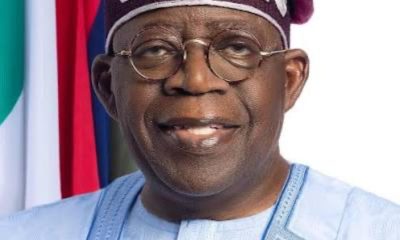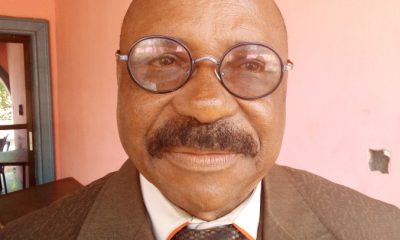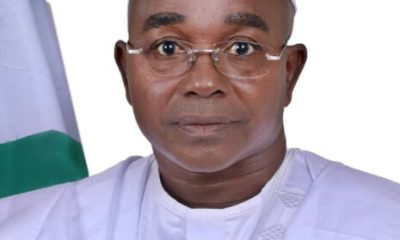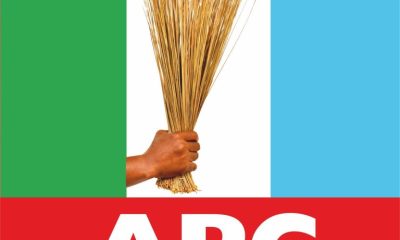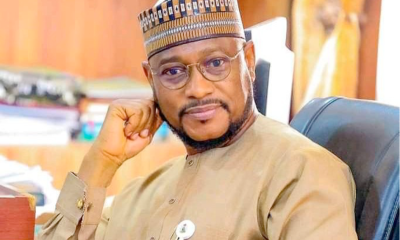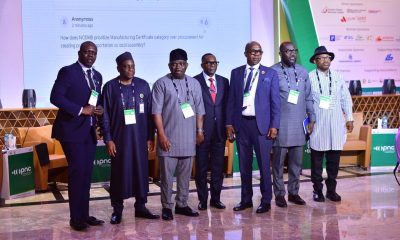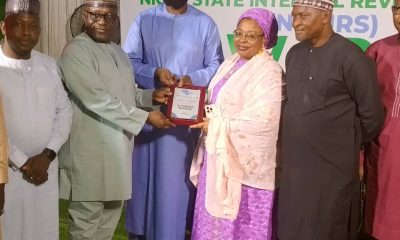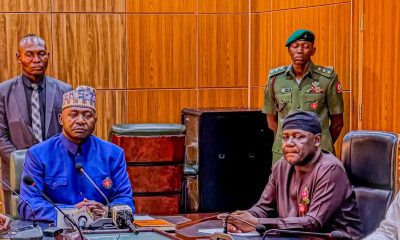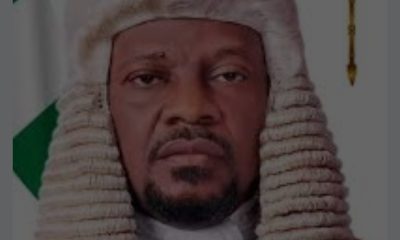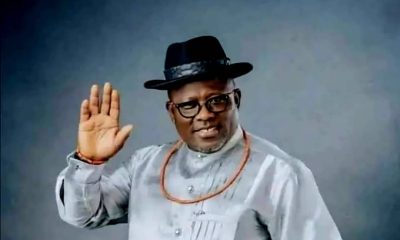Politics
The Tax Reform Bills and Akpabio’s Brinkmanship
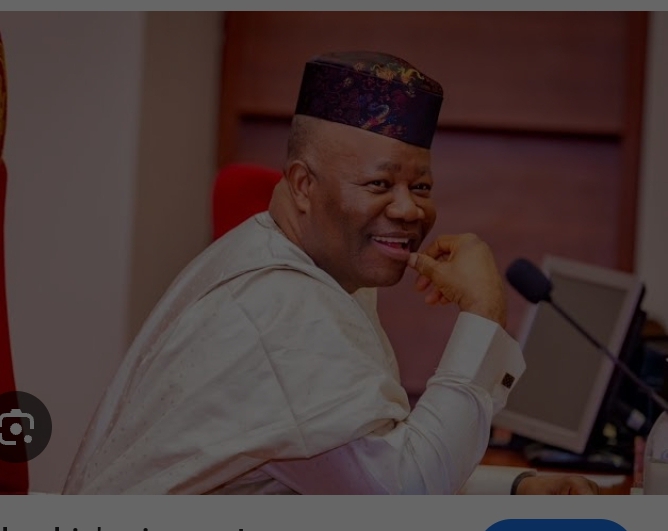
By Hon Eseme Eyiboh
The President of the 10th Senate, Senator Godswill Akpabio, GCON, is known for his mastery of brinkmanship in Nigerian politics. His ability to navigate complex political landscapes and negotiate contentious issues has earned him a reputation as a skilled and strategic leader. Hence, brinkmanship has been a hallmark of Akpabio’s legislative and political manoeuvres. Akpabio’s expertise in brinkmanship has contributed significantly to his success as Senate President, enabling him to effectively manage competing interests and drive legislative progress.
In his 26 years of active politicking and cognate governance, Senate President Akpabio has been able to etch his feet in the sands of history as one of Nigeria’s foremost transformative and dynamic leaders. From the state to the national level, he had garnered enough experience to navigate the tortuous path of the nation’s intriguing political landscape. Beginning as a commissioner in the state and later as governor for eight years, Akpabio demystified the difficulty most governors have in delivering on the derivatives of good governance. He set a standard which none of his successors have been able to match, thereby earning the sobriquet, Uncommon Transformer.
Having transitioned to national politics, Akpabio distinguished himself as the Senate Minority Leader, auditing and sifting through government proposals to the parliament, speaking and protecting the interests of the minority parties and the vulnerable citizenry. It must be acknowledged that it was in recognition of his performance and negotiation skills that he was made the minority leader against the ranking Rule in the Legislature. As minister, sitting in the Federal Executive Council and driving government policies at the highest level, Akpabio displayed uncanny governance wizardry and competence. His achievements at the Niger Delta Ministry are indelible, especially the completion of the uncompleted 20 years headquarters building of the Niger Delta Development Commission (NDDC) within his less than four years as minister. All these experiences culminated in his expertise in statecraft, which has become the hallmark of his excellence in managing human resources and issues of governance and national interest.
It is therefore not an accident that Akpabio, as Senate President, has become an integral part of the successes of President Bola Ahmed Tinubu’s administration, being driven by the Renewed Hope Agenda. As the chairman of the National Assembly and President of the Upper Chamber, Akpabio has brought experience, maturity, common sense and political sagacity to bear on the smooth running of the parliament and in initiating and sustaining a mutually responsible relationship with the Executive arm of government without compromising the independence of the legislature.
Akpabio has found a partner in President Bola Ahmed Tinubu, a skilled political strategist described by the Financial Times as ‘Nigeria’s wiliest politician’. Being one of the most prepared Nigeria’s presidents, Tinubu has clearly enunciated his reforms in the Renewed Hope Agenda. These bills are the fulcrum of the president’s reform agenda and when signed into law, they will escalate the intended goodwill and benefits to the nation’s economy. The Tax Reform Bills are therefore part of the foundation of his reform regime. And the president must be given credit for his vision and courage in initiating these bills. Of course, going by his antecedents, he is only replicating what he did in Lagos state as governor for eight years, transforming the Centre of Excellence through the instrumentality of tax revenue.
It is no longer news that the Senate last Wednesday adopted the harmonised version of the tax reform bills proposed by President Bola Tinubu. The legislative efforts mark a significant step in overhauling Nigeria’s tax administration and revenue generation framework, as part of Tinubu’s administration’s broader fiscal reform agenda. The tax reform bills include the Joint Revenue Board (Establishment) Bill, 2025 (SB.583); Nigeria Revenue Service (Establishment) Bill, 2025 (SB.584); Nigeria Tax Administration Bill, 2025 (SB. 585), and Nigeria Tax Bill, 2025 (SB. 586). These bills were transmitted to the National Assembly in November 2024.
When these bills were introduced, the nation was sharply divided along political, religious, and regional cleavages. These bills generated heated debates, particularly among lawmakers from different regions and interest. Northern lawmakers were vehement in their rejection of the proposal for 60% VAT revenue retention by generating states. The lawmakers were apprehensive and believed that the proposal would further impoverish their region. This was hotly contested and it indeed put the nation on edge. But after a careful negotiation, the benchmark was reduced to 30%, and the term “derivation” was replaced with “place of consumption”. They quietly put the agitation to rest. Again, the bills met a brick wall in the state governors, who, of course, wield so much power and they resolved to mobilise against it. The two chambers of the National Assembly were polarised and even the leadership of the Senate was at a point almost disagreed over the bills. But today, with Senator Akpabio’s tact and ingenuity in handling the affairs of the parliament, the bills are ready to be transmitted to the president for assent.
There is no doubt that Senate President Akpabio, conscious of the sensitive nature of the tax reform bills, the delicate thread of ethnicity, religious incongruity, and the natural human instinct to resist change, handled the precipitations that arose as a result of the introduction of the proposed legislations with prudence. He led from the front, and the bills were considered on their own merits, without pandering to party loyalty or executive interference, but with the sole interest of the generality of Nigerians. The process was diligent, transparent, and inclusive, with all the stakeholders given room to make inputs. No stage of the bill’s consideration was subdued; the public hearings were open and accessible. The contentious sections and clauses of the bills were carefully considered, sieved, and democratically amended or deleted to arrive at an acceptable bill that, when signed into law, would fast-track the socio-economic reforms of the Tinubu administration and catapult national development.
It is axiomatic that Akpabio’s brinksmanship necessitated this laudable and giant step forward. By the successful and peaceful passage of these bills without the anticipated national impasse, the Senate President has again demonstrated his ability to navigate key legislative priorities through consensus-building and general acceptability. Akpabio’s capacity to midwife, nurture, and sustain a mutually intelligible relationship with the executive branch, which the opposition and some naysayers unfortunately tagged “rubber stamp”, has instead espoused his capacity for strategic manoeuvring.
Akpabio, however, did not achieve this alone, it is with the studied cooperation of the distinguished colleague senators, who have always lined behind him and his leadership through thick and thin. Their solid support and contributions made the difference in the consideration and passage of these bills. As representatives of the people, they served as grassroots liaison officers that enlightened and advocated continuously to their constituents to buy into the import of the reform bills. In fact, without their cooperation, the journey of these bills would have been inchoate.
The House of Representatives under the leadership of the cerebral speaker, Rt. Hon. Tajudeen Abbas played a complementary role in consonance with its status as the second chamber of the national parliament. The vibrant and younger lawmakers were also instrumental in spreading the gospel of the tax reform bills to their constituents, making the job easier.
Most importantly, the state governors were indeed the game changers. To have stepped down from their initial antagonistic posture to embrace the amendments carried out by the Senate in fine tuning the bills, the governors helped in calming down frayed nerves in their various localities thereby setting the tone for a much more peaceful and smooth participation of other stakeholders in contributing purposefully. It was indeed a team work, with the proposed legislations competently initiated by Mr. President and ably coordinated by the Senate President and his colleagues with the understanding of the governors and other stakeholders.
As we await the transmission of the four tax reform bills to the president for his assent, credit must be given to Senate President Godswill Obot Akpabio for being the hub of legislative support, galvanising the much-desired reforms and balancing them with the demands of the people as expressed by their elected representatives. With two years to go in the life of President Tinubu’s administration, Akpabio’s unwavering contributions, firm, courageous, and passionate support cannot be underestimated as the nation anticipates reaping the benefits of the bold reforms of the Renewed Hope Agenda regime. It is time to give to Caesar what belongs to Caesar and God what belongs to God.
Politics
Rivers Assembly Speaker, 16 others dump PDP for APC
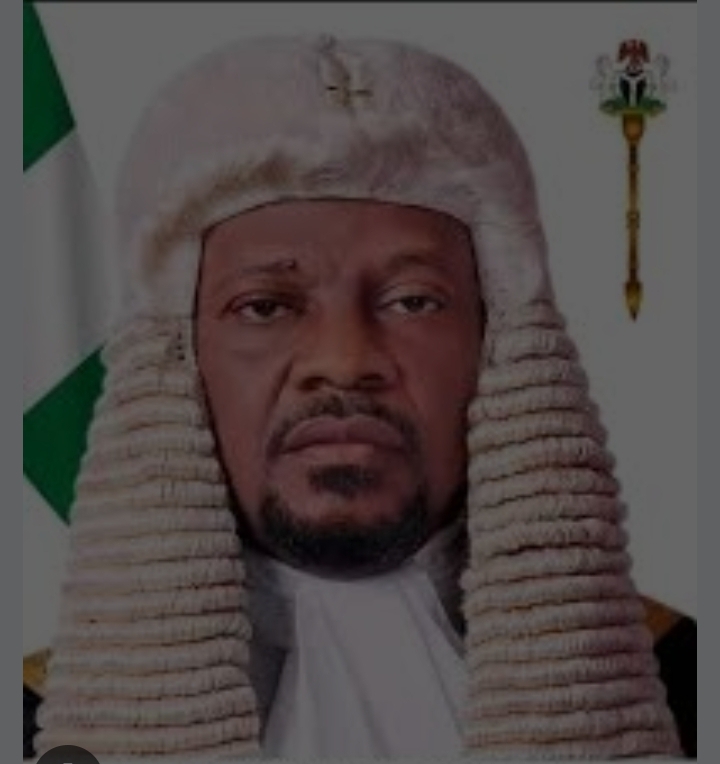
By Our Correspondent
Seventeen members of the 10th Rivers State House of Assembly, on Friday, defected from the Peoples Democratic Party (PDP) to the All Progressive Congress (APC).
The lawmakers announced their defection during plenary on Friday, December 5, 2025 at the Auditorium of the Assembly quarters currently used as the hallowed chambers.
The defected lawmakers, led by Speaker of the House, Martin Amaehwule, cited the division in the PDP at the national level as the reason for their defection, noting that the situation has made the future of the party “hazy and nebulous”.
Among the lawmakers who defected to the All Progressive Congress were; the Speaker, Martin Amaewhule, Deputy Speaker, Dumle Maol, Majority Leader, Major Jack, Deputy Majority Leader, Linda Somiari- Stewart, Chief Whip, Hon. Frankline Nwabuchi, and the Deputy Whip, Hon. Ofiks Kabang.
Others are; Hon. Peter Abbey, Smart Adoki, Igwe Aforji, Arnold Davids, Enemi George, Tekenari Granville, Christian Nwankwo, Gerald Oforji, Azeru Opara, Lolo Opuende, and Hon. Solomon Wami.
Recall that the Speaker, Martin Amaehwule had in December 2023, in the heat of the over two years political crisis in the state, led all 27 members of the Assembly loyal to the FCT Minister to the APC but later denied their defection, and returned to the PDP.
Meanwhile, the PDP which is now the minority party in the House with 9 members, has constituted their officers with Hon. Sylvanus Nwankwo emerging the Minority Leader, Hon. Barile Nwakoh was elected Deputy Minority Leader, Hon. John Dominic Iderima, Minority Whip, and Hon. Justina Emeji, Deputy Minority Whip.
The Assembly has also renewed its earlier call on the State Governor, Sir Siminalayi Fubara to forward his list of Commissioner-nominees to the House for screening and confirmation in line with the 1999 Constitution; regretting that “the State is yet to have the complement of a full cabinet.”
The Assembly also reaffirmed its earlier resolution made on the 14th of December, 2023, and adopted the auditorium at the State House of Assembly quarters as its legitimate and lawful Chamber for the conduct of legislative businesses for the life of the Tenth Assembly of the State.
Speaker of the Assembly, Martin Amaehwule in his speech lauded President Bola Tinubu for his purposeful and exceptional leadership and pledged their support to the APC and the President.
Politics
Sulu – Gambari , Ita Enang , Dambazzau , Ibas Ibok -Ete, 61 others make Tinubu’s Ambassadorial list
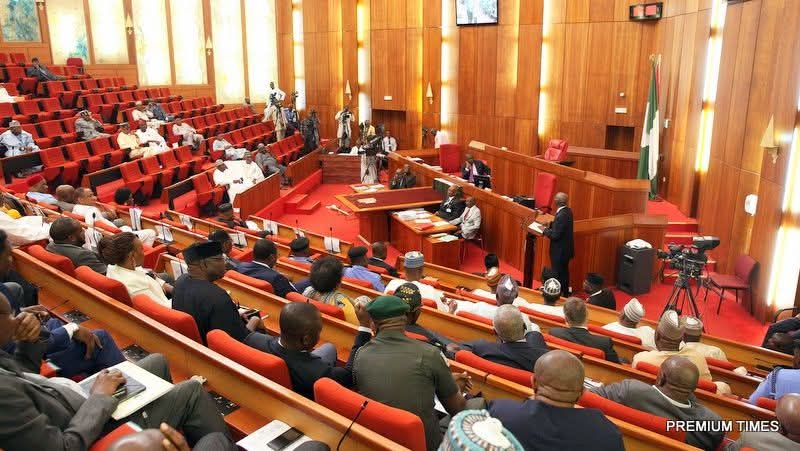
By George Mgbeleke
The Senate Thursday received requests for confirmation of nominations of 65 Ambassadorial nominees from President Bola Ahmed Tinubu.
The nominees as read from two different lists by the President of the Senate , Godswill Akpabio during plenary, fell into two categories of 34 Career Ambassadors and High Commissioners and 31 Non – Career Ambassadors and High Commissioners designate .
Notable names among the 34 Carrer Ambassadors and High Commissioners are Ambassador Sulu – Gambari Olatunji Ahmed from Kwara State , Ambassador Ahmed Mohammed Monguno from Borno State , Ambassador
Maimuna Ibrahim from Adamawa State etc .
Notable in the list of Non Career Ambassadors and High Commissioners are Senator Solomon Ita Enang from Akwa Ibom State , Vice Admiral Ibas Ibok – Ete from Cross River State , Ex Chief of Army Staff, Abdulrahaman Dambazzau from Kano etc .
President Tinubu in the requests hinged on section 171 sub section 1, 2 and 4 of the 1999 Constitution , sought for expeditious consideration of the nominees .
Accordingly, the President of the Senate, forwarded the requests to the committee on Foreign affairs for screening and report back within one week .
Recall that President Tinubu had earlier forwarded to the Senate , three ambassadorial nominees last week for appointment confirmation .
The three earlier nominees , namely
Kayode Are ( Ogun State), Aminu Dalhatu ( Jigawa) and Ayodele Oke ( Oyo State ), were screened on Wednesday by Senator Abubakar Sani Bello ( Niger North ) led committee .
Full list of the Ambassadorial nominees per state reads : ” Ambassador Ezenwa Chukwuemeka ( Abia ) Maimuna Ibrahim ( Adamawa ), Monica Ogochukwu ( Anambra) ,
Ambassador Mohammed Mahmoud Lele ( Bauchi) ,
Endoni Sindo ( Bayelsa) and Ambassador Ahmed Mohammed Minguno ( Borno ) .
Others are Jane Adams Okon Michael ( Cross River ), Clark Omeruo Alexandra ( Delta ), Chimma Geofrey Davies ( Ebonyi) ,
Oduma Yvonne Ehinose ( Edo State ), Wasa Segun Ige ( Edo State )
Ambassador Adeyemi Adebayo Emmanuel ( Ekiti ), Ambassador Onaga Ogechukwu Kingsley ( Enugu ) and
Magaji Umar ( Jigawa) .
Other nominees in the category of Career Ambassadors are
Mohammed Saidu Dahiru ( Kaduna ) ,
AbdulSalam Abus Zayat ( kano) ,
Shehu Barde ( Katsina ) , Aminu Nasiu ( Katsina ),
Abubakar Musa Musa ( Kebbi) ,Mohammed Idris ( Kebbi) ,
Bako Adamu Umar ( Kogi ) ,
Sulu Gambari Olatunji Ahmed ( Kwara ),
Ramata Mohammed ( Lagos ), Shaga John Shama ( Nasarawa )
Salau Hamza Mohammed ( Niger ) and Ibrahim Danlami ( Niger ) .
Others are
Adeola Ibrahim Mopelola ( Ogun) ,
Ruben Abimbola Samuel ( Ondo),
Akande Wahab Adekola ( Osun) ,
Adedokun Esther ( Oyo) ,
Gedagi Joseph John ( Plateau ) ,
Luther Obomode Ayokalata ( Rivers ),
Danladi Yakubu Yaku ( Taraba ) and
Bello Dogondaji ( ( Zamfara ) .
Names on the list of the 31 Non – career ambassadorial nominees are
Senator Grace Bent ( Adamawa ) , Senator Eta Enang ( Akwa – Ibom),
Nkechi Linda Okocha ( Anambra ),
Mahmud Yakubu ( Bauchi )
Philip K. Ikurusi ( Bayelsa ) ,
Paul Oga Adikwu ( Benue ),
Vice Admiral Ibok-Ette Ibas rtd ( Cross River ),
Hon. Abasi Braimah ( Edo ) and
Erelu Angela Adebayo Ekiti )
Others are Barrister Olumilua Oluwayimika Ayotunwa ( Ekiti ),
Rt. Hon. Ifeanyi Ugwuanyi ( Enugu State ) ,
Barr. Mrs. Chioma Ohakim ( Imo State ),
Lt. Gen. Abdulrahman Bello Dambazau (rtd.) ( Kano State ),
Hon. Tasiu Musa Maigari ( Katsina ) ,
Alhaji Abubakar Sanusi Aliyu ( Kogi) and
Olufemi Pedro ( Lagos State ) .
Others are
Barr. Mohammed Ubandoma Aliyu ( Nasarawa ),
Senator Jimoh Ibrahim ( Ondo), Ambassador Joseph Sola Iji ( Ondo ),
Fani-Kayode ( Osun ) , Professor O. Adewole ( Osun) , Florence Ajimobi ( Oyo ), Lola Akande ( Oyo), Professor Nora Ladi Daduut ( Plateau) , Yakubu N. Gambo ( Plateau ) , Chukwujinka Okocha ( Rivers ) , Haruna Abubakar ( Sokoto ) , Rt Hon Jerry Samuel Manwe ( Taraba ) and Adamu Garba Talba Nangree ( Yobe State ) .
Politics
Kano Guberpoll: Former LG chairmen adopt Sen Barau as APC’s sole candidate for 2027

By George Mgbeleke
Former local government chairmen in Kano State have adopted the Deputy President of the Senate, Senator Barau I. Jibrin, as the sole candidate of the All Progressives Congress (APC) for the 2027 governorship race in the state.
The former LG chairmen who served between 2019 and 2022, during the era of Dr Abdullahi Umar Ganduje as Governor of the state, adopted Senator Barau during a courtesy call to the National Assembly in Abuja on Wednesday.
A motion for the adoption of Senator Barau was moved by the former chairman of Rimin Gado Local Government Area, Barrister Dahiru Mannir Maigari, and seconded by the former chairman of the Association of Local Government of Nigeria (ALGON) in the state, Hon. Baffa Mohammed Takai.
When the former chairman of Madobi LGA, Alhaji Mohammed Yahaya, put the vote, all the former chairmen unanimously approved it through a voice vote.
Two members of the Kano State House of Assembly, Hon Zubairu Hamza Masu (Sumaila) and Hon Garba Yau Gwarmai (Tsanyawa/Ghari), witnessed the event.
A statement by the Special Adviser to the Deputy President of the Senate on Media and Publicity, Malam Ismail Mudashir, said that after the voice vote, the local government chairmen appealed to Senator Barau to declare for the governorship race as soon as possible.
Former chairman of Gwale LGA. Alhaji Khalid Ishak Diso informed the Deputy President of the Senate that the people of Kano, especially at the grassroots level, are eagerly awaiting his declaration for the race.
” Kano people are waiting for you to declare for the governorship race. We recently organised an event, where we asked you to declare. You are yet to. The people of Kano are anxiously awaiting your declaration. When are you declaring? Please answer the call to serve our people,” he said.
Also, the former Chairman of ALGON, Baffa Mohammed Takai, who led his colleagues on the courtesy call, said they adopted Senator Barau in view of his outstanding performance in parliament, adding that his contributions to Kano’s development are immense.
” We are here to throw our weight behind you. We are 100 per cent with you. Insha’Allah, you will be the next governor of Kano State, come May 29, 2027. You have the capacity to address the challenges facing our state,” he said.
Responding, the Deputy President of the Senate thanked the former local government chairmen for their support, describing them as grassroots politicians.
“It’s indeed true that Kano was second to Lagos before, in terms of development, in terms of commerce and so on. Unfortunately, Kano is now trailing behind due to a lack of good leadership. Let us not live in denial. This is a fact that we must all work together to address in the interest of our people and state.
“I wish to assure you that by the grace of God, we will take bold steps to bring Kano back to its glorious days. We will succeed by the grace of God. We will always stand by the truth and for our people,” he said.
* Tsanyawa, Ghari stakeholders endorse Barau
Meanwhile, stakeholders from Tsanyawa and Ghari LGAs of Kano State have also thrown their weight behind Senator Barau’s candidature during their visit to him on Wednesday.
A member of the Kano State House of Assembly, Hon. Garba Yau Gwarmai, representing Tsanyawa/Ghari, moved the motion, which Hon. Aminu Yakanawa seconded. A thunderous ovation from over 100 stakeholders in attendance followed the announcement of the endorsement.
Yakanawa told the Deputy President of the Senate that the people of the two local government areas are solidly behind him.
” By the grace of Allah SWT, you are the next governor of Kano State. Our people are solidly behind you, and we are committed to supporting you,” he said
Responding, Senator Barau thanked them for the support, saying the massive support from all the people of the state is a signal of what will happen in 2027.
On the security challenges facing some parts of Tsanyawa and Shanono LGAs, he said, ” We are not leaving any stone unturned in tackling this challenge. We are working underground to bring an end to it. We have taken all the necessary steps. It is not something that we go to radio stations to announce.”
-

 Business & Economy4 months ago
Business & Economy4 months agoPC-NCG Issues Disclaimer on Purported Nigerian Coast Guard National Orientation Exercise In Anambra State
-

 Entertainment1 year ago
Entertainment1 year agoJubilation galore as Parishioners of CKC Kurudu celebrate their cultural heritage ….FG should exploit our Cultural heritage to unite Nigerians-Rev Fr Dim
-

 Law & Crime6 months ago
Law & Crime6 months agoICPC pledges to collaborate with FIDA to end Sex for Marks in tertiary institutions
-

 General News1 year ago
General News1 year agoCelebration galore as UDA Successfully Elected New Exco ……I will digitalize processes that will raise UDA to greater height -Comr. Okejiri
-

 General News2 years ago
General News2 years agoReps hold public hearing on FMC Ugwuaji Awkunanaw
-

 Law & Crime5 months ago
Law & Crime5 months agoLegal practitioner raises alarm over threat to his life by CSP Muhammed Abdulkareem
-

 General News1 year ago
General News1 year agoKugbo Hill Tragedy: Trailer Crushes Car, Kills Four and Injures Several Others in Abuja
-

 Politics3 months ago
Politics3 months agoASUU-NDU protest against FG loans, unpaid salaries,Non-Implementation of agreements …..says loans is generational slavery



